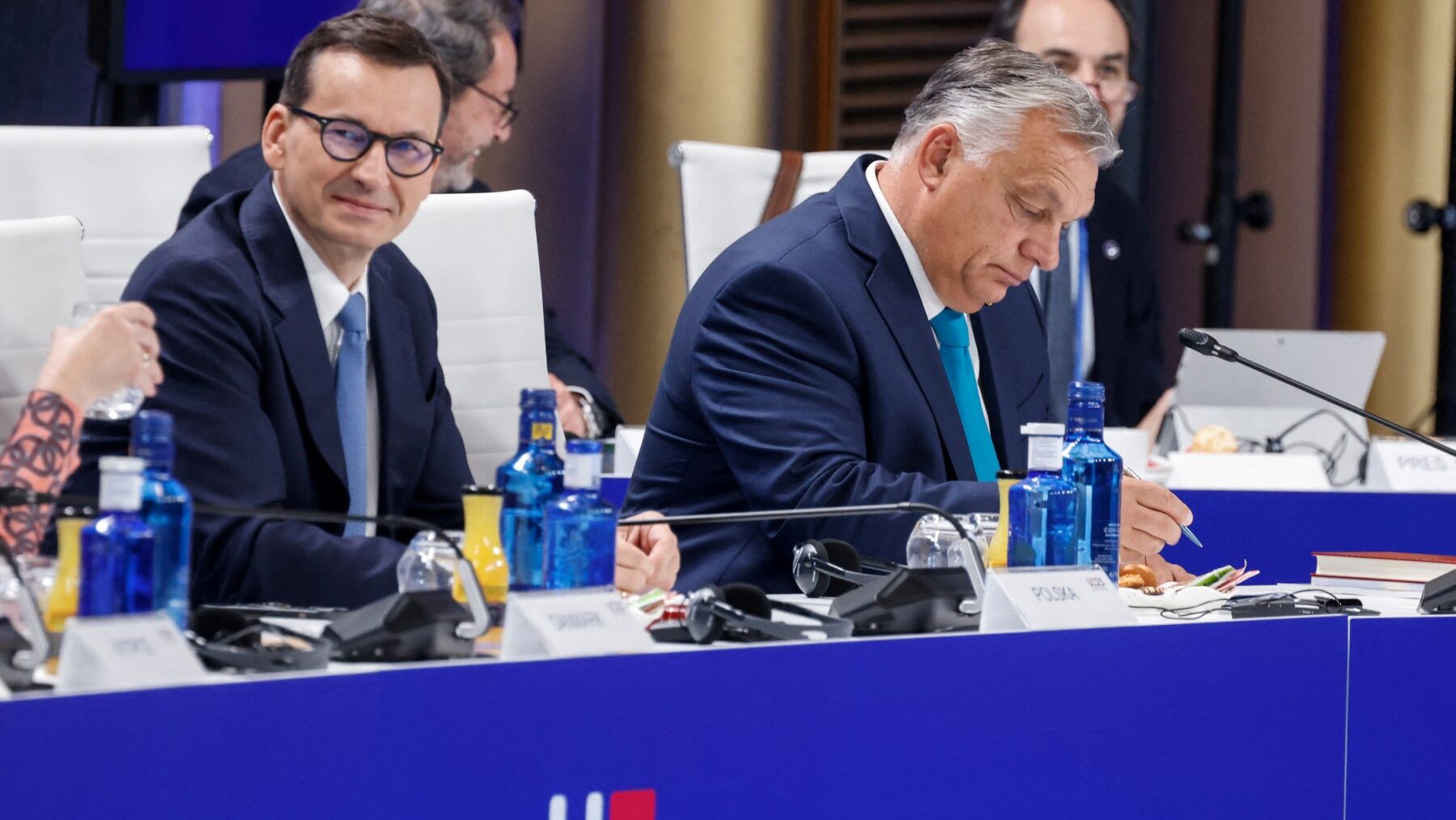
Photo: Ludovic MARIN / AFP
Hungarian Prime Minister Viktor Orbán and former Polish Prime Minister Mateusz Morawiecki lambasted the European Union’s Migration and Asylum Pact for not resolving the migration crisis, instead reaffirming the open borders policy of the EU. The conservative politicians were speaking at a press conference in the European Parliament (EP) on Tuesday, April 16th, one day before the start of an EU leaders’ summit in Brussels.
The Migration and Asylum Pact was recently adopted by the left-liberal majority of the EP, and has been harshly criticised by conservative and right-wing forces in Europe for infringing on nation-states’ sovereignty, and—in effect—sending out a letter of invitation to migrants wanting to reach the continent. The most controversial part of the pact is the ‘mandatory solidarity mechanism’—a tool forcing countries to choose between accepting migrants or paying hefty sums into a common fund.
Viktor Orbán, who has denounced migrant quotas—and whose government has built a fence on its EU external borders to stop illegal migrants from coming to Hungary—said the crisis will not be resolved if migrants are allowed to stay in Europe until their asylum claims are examined.
It’s time to get rid of the failed #Brussels bureaucrats. We need a change in Brussels! #NoMigration #NoGender #NoWar pic.twitter.com/g1HZa2lRKP
— Orbán Viktor (@PM_ViktorOrban) April 16, 2024
For the pact to be finally adopted, the measures must be approved by the Council (representatives of the governments of member states) with a qualified majority vote, denying individual countries the right of veto. The pact would then come into force in 2026.
Hungary’s prime minister said the pact should only be approved by unanimous voting, otherwise it “will not work and its implementation will be paralysed.” Viktor Orbán advocated a shift away from what he perceived as failed approaches. He called for change, stating, “The current EU leadership has to go and we need new people. The plan is to come and take over Brussels.” The European Parliamentary elections are set to take place June 6th-9th, and right-wing, anti-immigration forces are predicted to significantly strengthen in numbers.
Viktor Orbán’s conservative ally Mateusz Morawiecki, deputy leader of the Polish Law and Justice (PiS) party, said the Migration Pact is the new version of Willkommenskultur, the EU’s 2015 open border policy that has existed since the start of the migration crisis in 2015. He added:
There will be a lot of turbulence. It will be Willkommenskultur 2.0. The forthcoming European elections will be critically important from many points of view, but also to stop this madness. We cannot be held hostage by the ideological fantasies of Brussels officials. The migration pact could be a dynamite that could explode in the middle of Europe.
Morawiecki, whose party was ousted from power after October’s Polish elections, urged the new liberal prime minister Donald Tusk to reject the migration pact in the European Council.
Conférence en ce moment au Parlement européen à Bruxelles avec Victor Orbán, Premier Ministre de Hongrie, Mateusz Morawiecki, ancien Premier Ministre de Pologne et @FabriceLeggeri, ancien directeur général de Frontex.
— Jean-Paul GARRAUD (@JPGarraud) April 16, 2024
Condamnation unanime du Pacte migratoire européen ! pic.twitter.com/XZBpLSQYIu
Immigration was a hot topic during the Polish election campaign, with both PiS and Tusk’s Civic Platform (PO) party—which was in power 2007-2015—accusing each other of admitting illegal migrants to Poland on a mass scale. The debate was revisited on Tuesday, with Morawiecki saying that “Donald Tusk is a supporter of the migration pact,” because Tusk had said that a referendum held in October, in which 98.6% of the voters rejected admitting thousands of illegal immigrants from the Middle East and Africa, was invalid.
Tusk reacted on the social platform X by tweeting: “Mateusz Morawiecki is responsible, as a former prime minister, for bringing hundreds of thousands of newcomers from Africa and Asia to Poland.”
Mateusz Morawiecki odpowiada jako były premier za sprowadzenie setek tysięcy przybyszów z Afryki i Azji do Polski. Dziś usiłuje nieudolnie zagrać rolę twardziela w sprawie migracji. Mateuszu, od kłamstwa gorsze jest tylko głupie kłamstwo.
— Donald Tusk (@donaldtusk) April 16, 2024
Morawiecki took to X again on Wednesday, calling for the Tusk government to take the Migration Pact to court “to prove that Warsaw cannot be forced to accept relocated asylum-seekers.” He added that the pact is not legally enforceable and would be a disaster for the EU.
The EU's new migration pact is not legally enforceable and would be a disaster for the bloc.
— Mateusz Morawiecki (@MorawieckiM) April 17, 2024
The Polish government should take the matter to court to prove that Warsaw cannot be forced to accept relocated asylum-seekers.
🎙More in my interview for @dwnews here➡️… pic.twitter.com/72nhfQejdL
Despite the fallout, Tusk—who has been welcomed by the Brussels elite for his more liberal views—has said that “even if the Migration Pact comes into force in roughly unchanged form, we will protect Poland against the relocation mechanism.” He previously argued Poland should be exempt from the so-called solidarity mechanism as it has helped and taken in the largest number of Ukrainian refugees.
Another European leader likely to reject the pact is Slovakian Prime Minister Robert Fico, who said the mechanism “is not solidarity, but a dictate.” However, as Reuters points out, Warsaw, Bratislava, and Budapest lack sufficient votes to sink the deal on their own.
